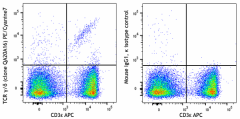- Clone
- QA20A16 (See other available formats)
- Regulatory Status
- RUO
- Other Names
- T cell receptor gamma/delta
- Isotype
- Mouse IgG1, κ
- Ave. Rating
- Submit a Review
- Product Citations
- publications

-

C57BL/6 mouse splenocytes were stained with anti-mouse CD3ε APC and anti-mouse TCR γ/σ recombinant (clone QA20A16) PE/Cyanine7 (left) or mouse IgG1, κ PE/Cyanine7 isotype control (right).
| Cat # | Size | Price | Quantity Check Availability | Save | ||
|---|---|---|---|---|---|---|
| 107305 | 25 µg | 130 CHF | ||||
| 107306 | 100 µg | 295 CHF | ||||
T cell receptor (TCR) is a heterodimer consisting of an α and a β chain (TCR α/β) or a γ and a δ chain (TCR γ/δ). TCR γ/δ belongs to the immunoglobulin superfamily, which is involved in the recognition of certain bacterial and tumor antigens bound to MHC class I. The γ/δ TCR associates with CD3 and is expressed on a T cell subset found in the thymus, the intestinal epithelium, and the peripheral lymphoid tissues and peritoneum. Most γ/δ T cells are CD4-/CD8- although some are CD8+. T cells expressing the γ/δ TCR have been shown to play a role in oral tolerance, tumor-associated tolerance, and autoimmune disease. It has been reported that γ/δ T cells also play a principal role in antigen presentation.
Product DetailsProduct Details
- Verified Reactivity
- Mouse
- Antibody Type
- Recombinant
- Host Species
- Mouse
- Formulation
- Phosphate-buffered solution, pH 7.2, containing 0.09% sodium azide.
- Preparation
- The antibody was purified by affinity chromatography and conjugated with PE/Cyanine7 under optimal conditions.
- Concentration
- 0.2 mg/mL
- Storage & Handling
- The antibody solution should be stored undiluted between 2°C and 8°C, and protected from prolonged exposure to light. Do not freeze.
- Application
-
FC - Quality tested
- Recommended Usage
-
Each lot of this antibody is quality control tested by immunofluorescent staining with flow cytometric analysis. For flow cytometric staining, the suggested use of this reagent is ≤ 1.0 µg per million cells in 100 µL volume. It is recommended that the reagent be titrated for optimal performance for each application.
- Excitation Laser
-
Blue Laser (488 nm)
Green Laser (532 nm)/Yellow-Green Laser (561 nm)
- Application Notes
-
Clone QA20A16 is able to completely block the staining of clone GL3 on target cells.
- RRID
-
AB_3083259 (BioLegend Cat. No. 107305)
AB_3083259 (BioLegend Cat. No. 107306)
Antigen Details
- Structure
- Ig superfamily, associates with CD3 complex
- Distribution
-
T cell subset in thymus, intestinal epithelium, peripheral lymphoid tissues and peritoneum, most γ/δ T cells are CD4-/CD8-, some are CD8+.
- Function
- Antigen recognition
- Interaction
- CD3 complex
- Ligand/Receptor
- Some bacterial or tumor antigens bound to MHC class I.
- Cell Type
- Lymphocytes, T cells
- Biology Area
- Adaptive Immunity, Cell Biology, Immunology, Innate Immunity
- Molecular Family
- TCRs
- Antigen References
-
- Skarstein K, et al. 1995. Immunology. 81:497.
- Harrison LC, et al. 1996. J Exp Med. 184:2167.
- Wildner G, et al. 1996. Eur J Immunol. 26:2140.
- Brandes M, et al. 2005. Science. 309:264.
- Gene ID
- 110066 View all products for this Gene ID 110067 View all products for this Gene ID
- UniProt
- View information about TCR gamma/delta on UniProt.org
Related FAQs
Other Formats
View All TCR γ/δ Reagents Request Custom Conjugation| Description | Clone | Applications |
|---|---|---|
| Purified anti-mouse TCR γ/δ Recombinant Antibody | QA20A16 | FC |
| FITC anti-mouse TCR γ/δ Recombinant Antibody | QA20A16 | FC |
| PE/Cyanine7 anti-mouse TCR γ/σ Recombinant Antibody | QA20A16 | FC |
Compare Data Across All Formats
This data display is provided for general comparisons between formats.
Your actual data may vary due to variations in samples, target cells, instruments and their settings, staining conditions, and other factors.
If you need assistance with selecting the best format contact our expert technical support team.
-
Purified anti-mouse TCR γ/δ Recombinant Antibody

C57BL/6 mouse splenocytes were stained with anti-mouse CD3 A... -
FITC anti-mouse TCR γ/δ Recombinant Antibody

C57BL/6 mouse splenocytes were stained with anti-mouse CD3ε ... -
PE/Cyanine7 anti-mouse TCR γ/σ Recombinant Antibody

C57BL/6 mouse splenocytes were stained with anti-mouse CD3ε ...
 Login / Register
Login / Register 












Follow Us